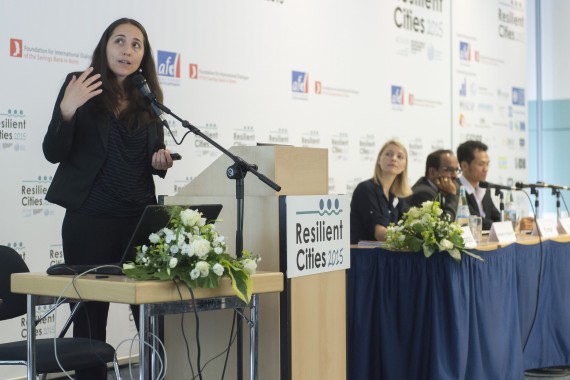
Photo: Saliha-Dobardzic-Resilient-Cities-2015
Global Environment Facility launches new sustainable cities programme
09 June 2015
by Richard Forster
At ICLEI’s Resilient Cities 2015 congress today, the Global Environment Facility (GEF) announced the approval of a new sustainable cities programme that will cover 23 pilot cities in 11 countries with an investment of US$150 million in GEF grants, together with US$1.5 billion in additional financing from other implementing agencies.
“The Sustainable Cities Integrated Approach Pilot is a flagship programme of the GEF, and was just approved last week,” Saliha Dobardzic, Senior Climate Change Specialist, Global Environment Facility, told delegates attending the congress. “This initiative aims to look at various drivers of environmental degradation in cities and help address them in order to promote sustainable urban planning and development.”
This ambitious five-year endeavour is a partnership between the Global Environment Facility, all levels of governments, together with a number of UN agencies, the World Bank and regional development banks. The goal is to promote an approach to urban sustainability that is guided by evidence based, multi-dimensional, and broadly inclusive planning processes that balance economic, social, and environmental resource considerations.
The project will take a more integrated approach in helping to catalyse investments in sustainable cities, using a unified performance framework to monitor and report on local indicators. The programme will demonstrate how innovation and high impact investments can contribute to a sustainable management of cities.
“In five to ten years we are hoping that participating cities will be recognised as leading examples of sustainable urban management, and yield clear and quantified local and global environmental benefits,” added Dobardzic. “Leaders and officials of these pilot cities are envisaged to gain and put into practice the expertise and policy means to address global environmental concerns in an integrated manner. We hope for replication and continuation of these efforts, building beyond the life of the project.”
As one of the principal agencies involved in the project, the World Bank took the lead in designing different parts of the Sustainable Cities Integrated Approach Pilot, looking beyond just climate resilience and disaster risk management, and putting more focus on urban resilience.
“One of the guiding principals of the Integrated Approach Pilot is an emphasis on comprehensive, evidence based, inclusive planning, and pushing cities to develop an approach to planning that is broader in scope, deeper in ambition and more formally embedded within local/regional/national governance structures,” said Astrid Westerlind Wigstrom, Climate Resilience Consultant at the World Bank. “We need to take a network approach. Cities are part of a complex web of stakeholders, and the programme will seek to help cities work with these stakeholders to achieve maximum impact.”
Geographic scope of pilot initiative:
11 countries: Brazil, China, Cote d’Ivoire, India, Malaysia, Mexico, Paraguay, Peru, Senegal, South Africa, Vietnam
23 cities: Brasilia, Recife, Gran Asuncion, Lima, Dakar, La Paz, Campeche, Xalapa, Vijayawada-Guntur, Mysore, Jaipur, Bhopal, Abidjan, Melaka, Johannesburg, Hue, Guiyang, Shenzhen, Ningbo, Nanchang, Beijing, Tianjin, Shijiazhuang











